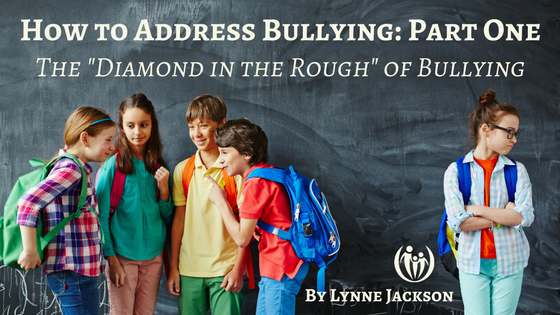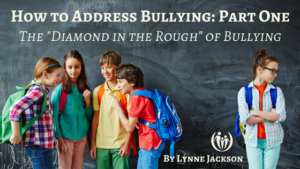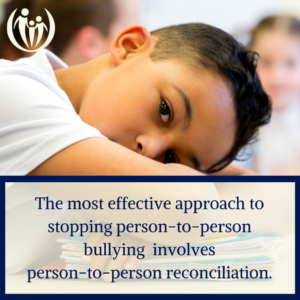
The Diamond in the Rough of Bullying

You learn that your child has been bullied at school. Your blood pressure skyrockets. You want justice NOW! “THIS IS NOT OK! I’M CALLING THE SCHOOL!!” An understandable reaction. It is natural to quickly and emotionally defend your child against harm. But to do so is to potentially miss the great opportunity to find diamonds in the rough of bullying.
Don’t get us wrong. We hate bullying and want to do what we can to make it stop. But let’s be honest. The things people typically do to get bullying to stop aren’t working. Punitive approaches and public shaming often used are only leading to more bullying.
Even in our own homes, when parents react strongly and try to take immediate control, they may unwittingly add power to the bullying and disempower their children.
Here’s how it works. First, when we take control we take power out of our kids’ hands. This communicates to them that they can’t handle the situation on their own. We also then increase their fear of the people who mistreat them, thus making them even more vulnerable.
We have found that viewing bullying through the lens of God’s grace can both empower those who are bullied and transform those who bully. There are diamonds to be found. Let’s find them.
Start with a breath and a prayer.
When you get the report of bullying, close your eyes. Take a breath. Say a prayer. “Lord give me your wisdom and grace for this.”
Suspend Judgement.
Where the typical response is to get angry and label the other child a bully and your child a victim, it’s much more constructive to understand that on both sides of the bullying are kids who need to know they are safe, loved, empowered, and responsible. We can still be angry, but this perspective can help us to “sin not.” (See Ephesians 4:26.)
Seek your child’s perspective.
Ask questions in a relaxed, non-judgmental way. Listen for and repeat your child’s answers. What’s happening? What’s going on with the other child? What have you done so far to contribute to a solution? Have you contributed to the problem?
Empathize.
Let your child know you see they are upset. Tell them about times when you got picked on, and what you did to overcome it. Share stories of successes and failures, and the lessons you learned.
Look below the surface of the bullying.
In the movie “Hook” Peter Pan’s daughter Maggie made an astute observation about Captain Hook, “You need a mother very, very badly!” People hurt others or put others down when they are chronically unhappy. Compassion for kids who bully is a strength, not a weakness. One 6-year-old powerfully taught his mom a lesson when he said, about the child teasing him, “I know his bucket is empty and that’s why he’s doing it.”
Offer compassion.
The six-year-old in the story above offered to play games with the one who bullied him. At our home we invited kids and their parents over for games. The bottom line is that often, when we move toward bullying behavior with grace and compassion, we meet the deeper need of the one who resorted to bullying.
Make a plan.
Ask your child, “What’s going to make you feel better about this situation?” “What would help you be confident in dealing with this person?” How do you want to solve this?” These questions put the responsibility on your child to think through and make an effort to solve the problem. It may be scary at first, and you can accompany them, but let them do the talking. It will be well worth it in the long run. Keep in mind that the most effective approach to stopping person-to-person bullying involves person-to-person reconciliation.

Proactively arm your child with encouraging truth.
Knowing he may one day be teased because of it, Jim’s mom convinced him early in life that the large purple birthmark over his back and arm was the coolest, most creative shape ever. When he got teased harshly at the swimming pool, he grinned, “I know, isn’t it cool?!” The teasing died out quickly.
Some general examples of truth:
-
- “How they treat people is about them, not me.”
- “Jesus (the coolest person ever!) was bullied by the Pharisees.”
- “This is really hard, but God can use it to make me stronger and more compassionate.” (Our son became very passionate about helping “underdogs” after being mistreated by peers.)
- “The way people treat me doesn’t change what God thinks about me”
When bullying continues…
Sometimes, like with Captain Hook, bullying persists in spite of all efforts. When this happens the plan must set boundaries and limits that involve other authorities. Fight against the temptation to become bitter. Talk respectfully to the principal, counselor or police officer, not accusingly or with harsh judgment, but with a desire for restoration.
Persistent bullying can seem like an insurmountable obstacle, but God can use any difficult trial for good purposes. Bullying can be an invaluable opportunity to bring the diamond of God’s grace and truth to life, and to develop in your children compassion, resilience and skills for a lifetime.
Want to learn more? Check out Part 2 and Part 3 in our series of posts on bullying.
Sign up below to receive a weekly dose of encouragement straight to your inbox:

